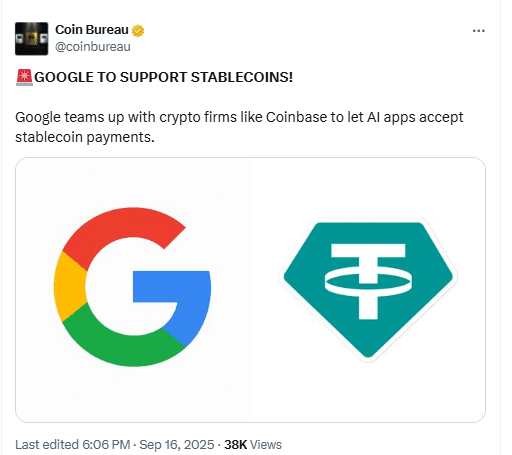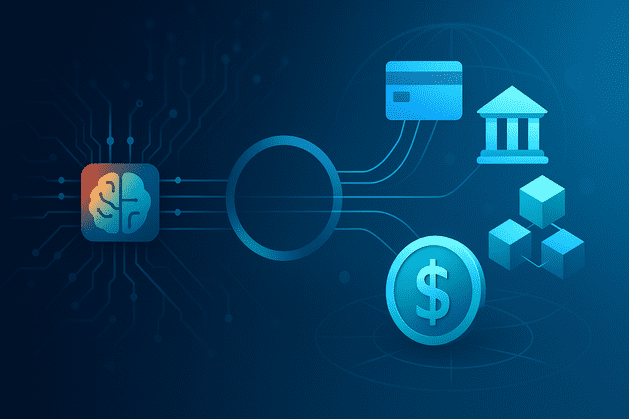Google launched the Agent Payments Protocol (AP2) to let AI agent payments move over cards, bank rails, and stablecoin payments.
Coinbase helped build the crypto path through Coinbase x402, while more than 60 partners joined the effort, including Salesforce and American Express. The standard extends Agent2Agent (A2A) and Model Context Protocol (MCP) so agents can discover each other, coordinate tasks, and then settle.
AP2 Stablecoin Payments: Google and Coinbase Link AI Agents to Money
AP2 publishes a common format for AI agent payments and verification. Google’s launch note lists names from payments, cloud, and crypto and sets AP2 next to A2A and MCP as the new settlement layer. The document confirms support for stablecoin payments alongside cards and bank transfers.

Coinbase x402 is the stablecoin bridge inside AP2. Erik Reppel and the Coinbase team describe x402 as enabling “instant stablecoin payments directly over HTTP,” built for APIs, apps, and AI agents. Google’s partner list and coverage align on the role of Coinbase in making agent-to-merchant flows interoperable.
Agent2Agent (A2A) and MCP: The Stack Under AP2
Google introduced Agent2Agent (A2A) in April 2025 to let agents advertise capabilities and work across vendors. The A2A developer post outlines how agents exchange messages, verify identity, and orchestrate actions. AP2 plugs into that stack as the payment layer for AI agent payments.
The A2A material sits next to MCP, which tools like Salesforce and SAP reference in Google’s materials. This pairing explains how AP2 can route stablecoin payments after agents agree on a task. It keeps a consistent language across discovery, action, and settlement.
Industry write-ups note that bringing A2A, MCP, and AP2 together reduces custom glue code for AI agent payments. That message appears across the launch ecosystem posts and partner quotes.
x402, HTTP 402, and EIP-3009: How Stablecoin Payments Work
Coinbase x402 implements HTTP 402 “Payment Required” so agents can request and confirm stablecoin payments over the web. The Coinbase note credits Erik Reppel and colleagues and explains how AI agents transact with signed authorizations. EIP-3009 enables those authorizations so agents can move tokens without exposing private keys.
Developers and media highlight that HTTP 402 plus EIP-3009 lets AI agent payments run without a human in the loop. Reports also cite early experiments where agents pay for compute or content and chain services together using stablecoin payments.
Coverage last month added a broader claim: autonomous agents could become Ethereum’s “biggest power user” as stablecoin payments scale. That framing comes from developer threads amplified by the Ethereum Foundation’s channels.
Partners and Numbers: 60+ Firms Back Google AP2
Google and outside reports list more than 60 supporters for Google AP2. Names include Salesforce, American Express, PayPal, SAP, Deloitte, McKinsey, and PwC. The group spans processors, networks, and software vendors, which is relevant for AI agent payments in retail and enterprise settings.
Launch coverage reiterates that AP2 supports stablecoin payments, cards, and real-time bank transfers. This helps agents interact with existing checkout systems while introducing stablecoin rails through Coinbase x402.
Google’s post and partner notes emphasize verifiable records of who approved what, which matters for disputes and audits. That trace helps AI agent payments meet compliance needs across providers.
Regulatory Context: GENIUS Act Stablecoin Law and the Ethereum Foundation AI Team
In the United States, the GENIUS Act stablecoin law was signed on July 18, 2025. The White House notice and legal memos describe reserve, redemption, and licensing rules for payment stablecoins. This framework is the backdrop as AP2 rolls out stablecoin payments with Coinbase x402.
A Congressional Research Service brief confirms the law’s scope and timing and places it within broader digital-asset oversight. The statutory clarity is relevant for issuers and agents that will integrate AI agent payments into production systems.
Separately, the Ethereum Foundation AI team launched this week. Announcements describe a focus on payments, trust, and standards, including work that touches HTTP 402, EIP-3009, and agent discovery proposals. Those efforts alig

